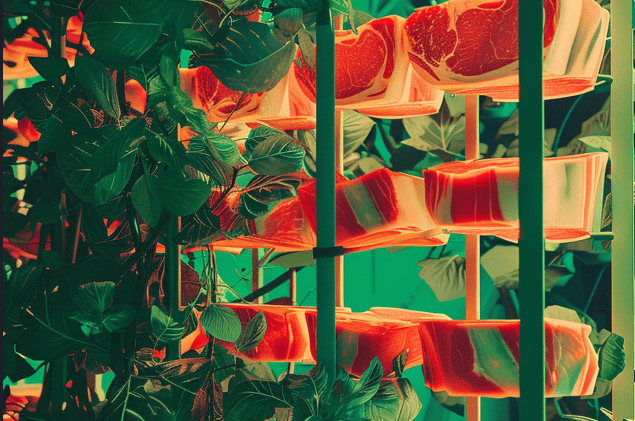
The start-up Rebel Meat originally began with Skype meetings between Basel and Vienna. Biochemist Cornelia Habacher held a postgraduate position at the Univeristy of Basel and wanted to invent a low-meat, sustainable hamburger. She found a partner with start-up experience in Philipp Stangl, Vienna, who took over the quest for investors. Wolfgang Haidinger later joined the team, a business economist with experience in the hospitality sector.
Cattle farming requires 25 kilograms of feed for each kilogram of meat. This basically means that a lot of valuable raw materials are wasted, Cornelia explains. “We’ve been thinking about how we can feed the world in 2050. We have looked very objectively into the problem of meat consumption and associated consumption of raw materials. It turned out that there were nothing but plant-based solutions. However, there was also a potential solution in the form of in vitro meat; as in cultured meat. Both solutions took far too much time and money to develop. So we wanted to design a product that made an immediate difference: a hybrid, whereby meat consumption would be reduced.”
And how does that work?
“Our products are made up of 50 % meat and 50 % royal oyster mushrooms, millet and spices. This mixture is more nutritious than pure meat and has 50 % less cholesterol and fat. Many people want to cut back on their meat consumption, but they’re not satisfied with vegan alternatives. With Rebel Meat, they can opt for eating sustainable meat which they totally enjoy. A ‘veggie burger’ may be more environmentally friendly, but we can reach a larger target group with Rebel Meat. As a result, our burgers have a higher positive impact on the environment. The burger is our first product. But we are constantly working on more and more developments and aim to create a new standard with the hybrid. Alongside meat and plant-based meat substitutes’.
The first hamburger was launched shortly after the company was set up. Was it that simple?
(Laughs) ”There were plenty of obstacles, so it’s hard to tell which was the main one. The search for a manufacturer wasn’t easy. But the two butcher shops that we are now producing with are innovative and enjoy making new products. We only worked with subsidies for a long time after that. We’ve just received the first funding in December 2019. Although we shouldn’t underestimate government subsidies and support. We initially received a Climate-Kic subsidy – which was confirmation that our solution is relevant to the problem. Without this kind of confirmation, you run the risk of losing your way.”
What were the best moments?
“There’s a wonderful moment almost every day. The first crucial moment was ordering a hamburger in a restaurant – the actual product that you made yourself. Team building was also a lot of fun. The moment you realize that it’s becoming a real business and you don’t have to do everything yourself anymore. We were also in Switzerland for a test. It is very ‘cool’ to work on international expansion in the same year of your foundation. It took us almost three weeks to get the meat to Switzerland. But the tasting session was successful. That was also a form of validation.”
What can we expect from the company in a year’s time?
“This year is the year of the test markets. We want to find out which channels work best. At present, we’re working with wholesale and direct sales. But we also want to go into retail. At the same time, we want to establish contacts in Germany and build up a network in the German-speaking regions of Europe. We are also looking to find manufacturers in other countries in order to be able to produce regionally. But before we internationalize, we first want to cover the Austrian market”.
Where do you want to be in five years with Rebel Meat?
In the long term, we want to work with cultured meat products. This is meat grown from meat from muscles, which doesn’t require any animals to die. We don’t want to develop it ourselves, we want to buy it. Worldwide, there are currently 25 start-ups involved in the industrial production of cultured meat. We want to continue with our plant-based mixture, but reduce the meat content from 50 % to 25 % – with 100 % satisfaction in the meat taste.
With the hybrid, we are building a community that already comes into contact with a mixture of meat and plant-based products. It is easier to open up a market via gradual changes. “Most people can’t cope with abrupt dietary changes.”
What makes your innovation better or different from existing meat substitutes?
“Mixed meat products aren’t available yet in Austria. The idea of mixing meat is still novel and there are only a few suppliers. We are confident about the taste of our hamburgers. The spice ingredients that we use are not only healthy, but they also taste great. But above all, we are producing them in a sustainable way. As a meat-eater you can also do something for the environment with Rebel Meat.”
Still need staff?
“Yes, we’re looking for a head of marketing.”
You can read more articles about start-ups here.






